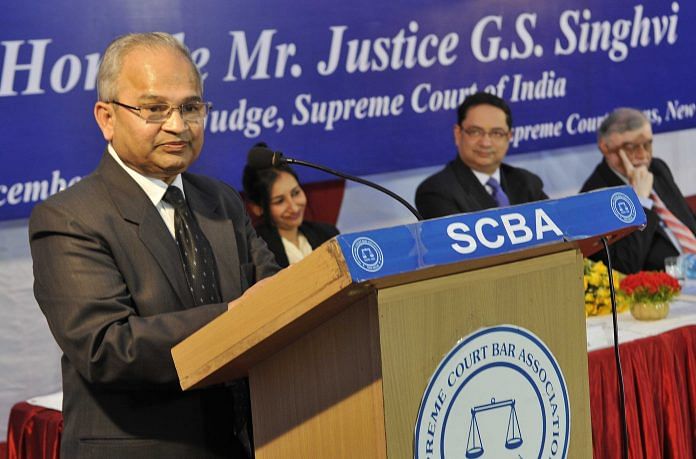Justice G.S. Singhvi, senior in the two-judge bench who wrote verdict, has been criticised for “bias” and insensitivity towards LGBT community.
New Delhi: Former Supreme Court judge G.S. Singhvi, criticised for his 2013 ruling upholding Section 377 of the Indian Penal Code which criminalised gay sex, said the issue of child sex abuse had prompted his decision to retain the colonial law.
“We had seen a lot of material on child pornography that was submitted by a Lucknow-based intervenor and that weighed on my mind,” Singhvi told ThePrint.
The Lucknow-based intervenor was the Krantikari Manuvadi Morcha, a conservative group that had challenged the 2009 Delhi High Court verdict decriminalising homosexuality.
Justices Singhvi and S.J. Mukhopadhyaya who had upheld Section 377, which was struck down earlier this month, continue to be criticised for their alleged “bias” and insensitivity towards the LGBT community.
Mukhopadhyaya refused to comment on the verdict but said “it was written by the senior judge”.
Also read: How the Section 377 ruling is linked to the problem of judges’ appointments
Although Singhvi wrote the 98-page verdict that was delivered on his retirement day, Mukhopadhyaya, the junior judge on the two-judge bench, had another chance to correct the ruling when he heard the review petition along with Justice H.L. Dattu.
But the review petition was dismissed.
The court’s ‘insensitivity’
Lawyers who argued the case the first time it came up in the Supreme Court recalled “the insensitivity” with which Singhvi and Mukhopadhyaya asked questions.
The judges had sought an explanation for terms such as MSM and carnal intercourse.
While debating what is ‘natural’ and ‘unnatural’ sexual activity, one judge was thinking aloud whether “a mother putting her breast in the mouth of her infant child” would amount to unnatural sexual activity.
Since Singhvi had asked almost every lawyer if they knew any gay person, senior advocate Shyam Divan appearing for the petitioners took it upon himself to answer the question.
Divan, who belongs to a prominent family of lawyers and has a gay brother, Vivek Divan — who has himself worked to repeal Section 377 — read out a list of famous gay people. “Homosexual persons might be invisible in the society but I personally know them as colleagues, friends and family,” he told Singhvi.
During the hearing, Singhvi constantly said that society does not accept homosexuality, loudly hinting which way the verdict would go.
Also read: Jains of Jodhpur: How a tiny community ruled India’s Supreme Court
Referring to the LGBT community as a “minuscule” fraction and labelling their fundamental rights “so-called rights”, the ruling made many observations that were strongly criticised.
“The 2013 ruling was not just a mere ‘judgment’, it was ruling on the lives and rights of thousands of LGBT persons. The effect catastrophic on the community already on the margins was further pushed away. Many were blackmailed, extorted and violated. The trust between queer individuals, and the institutions, already frayed, totally broke down,” advocate Mihir Samson said. “In any case, this case was never about child sexual abuse or pornography, it is about consensual relationships between adults.”
Singhvi’s controversial opinions are not limited to homosexuality. The upper caste retired judge also thinks caste-based reservation is “ridiculous.”
“Real criteria should have been economic. You should have graded scales on the basis of income and make them fall under 1st, 2nd or 3rd categories,” he said in an interview last year to the website Legalbites.
Allegations of bias
Advocate Gautam Bhatia, who had strongly criticised the 2013 ruling, tweeted that the SC had “finally atoned” on 6 September when the court struck down Section 377.
They have atoned.
— Gautam Bhatia (@gautambhatia88) September 6, 2018
Naz Foundation, the gay rights advocacy group had also filed a curative writ petition and took up the ground that the judges were “inherently biased” towards the LGBT community.




The internet has transformed the availability of all kinds of explicit material. So child porn is not something that can be banished by a judgment of the apex court. There may not be justification for denying elevation because a particular high court is overrepresented. However, having so many wise judges from a tiny corner of Jodhpur could be avoided for the future …